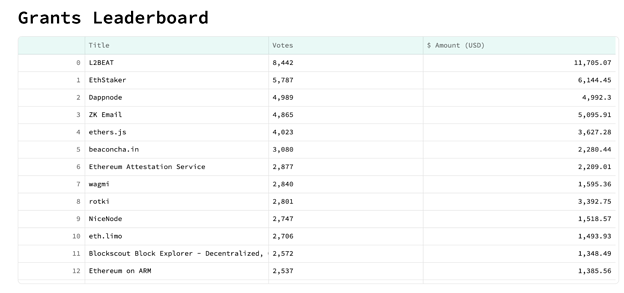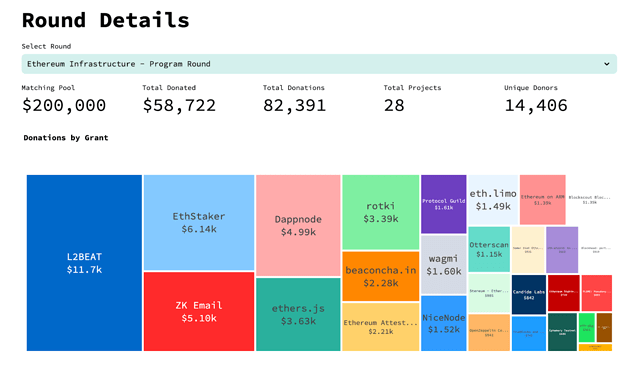Co-authors : @connor + @sejalrekhan
This post is purely a reflection of the operational aspects of the last round and is intended solely for the purpose of learning in public. We aim to share our learnings to foster continuous improvement and collective learning.
The Eth Infra round, initially launched in GR-14, was established to direct funding towards Ethereum core developers and projects directly impacting the protocol. As the round began to evolve and expand, however, it gradually shifted away from its primary objective of exclusively funding projects that advance Ethereum. This led to the Eth Infra round in GG19 reverting to its original approach, transitioning from an open application process to a curated format.
GG19 Eth Infra round involved the inclusion of teams and individuals who support essential aspects of the Ethereum network, emphasizing projects that principally contribute to the success and sustainability of Ethereum. Although the exclusion of an open application process might have caused disappointment for some, it was observed that the Eth Infra round had expanded beyond its initial purpose over time. The decision to adopt a more proactive stance in curation and concentrate on genuine infrastructure and core development efforts was made with the intention of revitalizing the enthusiasm and momentum associated with this round.
Before the Round
In this round, we effectively identified appropriate projects for inclusion based on prior round participation and the new criteria. However, our goal to work closely with a (hypothetical) Ethereum Round Council (EIRC) - a group of community representatives aiding in curation - faced challenges. Engaging people in decision-making proved difficult, partly due to irregular meeting schedules among other factors. As a result, the curation for this round was primarily carried out by our internal team, a practice we aim to avoid in the future to prevent centralization. Historical data also helped to inform the selection process, specifically from prior QF round results and applications, as well as other grant programs. Consequently, the majority of the projects included were same grantees, with very few new projects in the round.
Looking forward to the next round, we intend to have community representatives who are willing and able to assist with curation, possessing both the necessary knowledge and the time commitment. Aim to have a diverse group to ensure neutrality in the selection process. It would be optimal to begin this preparation and selection process at least two months prior to the scheduled round.
During the Round
Managing program rounds across different chains can be challenging. EthInfra, for instance, was deployed on Polygon, making it somewhat distinct from the other two rounds. Streamlining all rounds to operate on the same chain would likely simplify the process for both donors and grantees.
The appeal form for review wasn’t adequately disseminated, indicating a need for better communication regarding the round’s structure and the invitation process.
Implementation
-
This was our first round on Polygon. The deployment process was executed smoothly, though there were some complications with donations (specifically, issues with USDC transactions). The details regarding payouts are still being finalized.
-
Communication with invited grantees was primarily via email. However, not all recipients opened these emails, despite follow-up attempts. It appears that many grantees may not have seen these communications.
-
We sent an "Appeals & Requests for Consideration” form to projects that were not selected. We decided against publicizing this form widely to avoid turning the round into a de facto open application process with additional steps and it ended up being not circulated well. The form can be accessed here: https://forms.gle/2Mwqvbj1YrWVqc6q9.
-
Invite/denial email copies sent to past infra grantees: Infra GG19 Emails
-
Made a general plan for a council of curators to begin this round and grow in the future, but ended up hard to meaningfully engage the people we wanted to help Ethereum Round Council (EIRC)
Outcomes and Statistics
Data - source: gitcoin.co/grants-data

